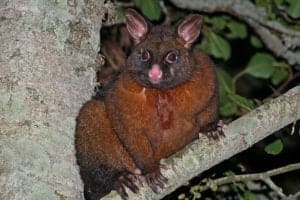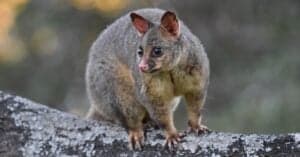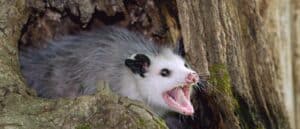Are possums ugly or cute? The answer largely depends on whether or not they’ve caused problems on your property. Some people see these marsupials as incorrigible pests and want them off their lawns and away from their houses. Others look at possums and see the potential for adorable, furry companions. But is it wise to keep possums as pets? Perhaps more to the point, is it even legal? Find out this and more as we explore the pros and cons of keeping a pet possum!
What is a Possum?
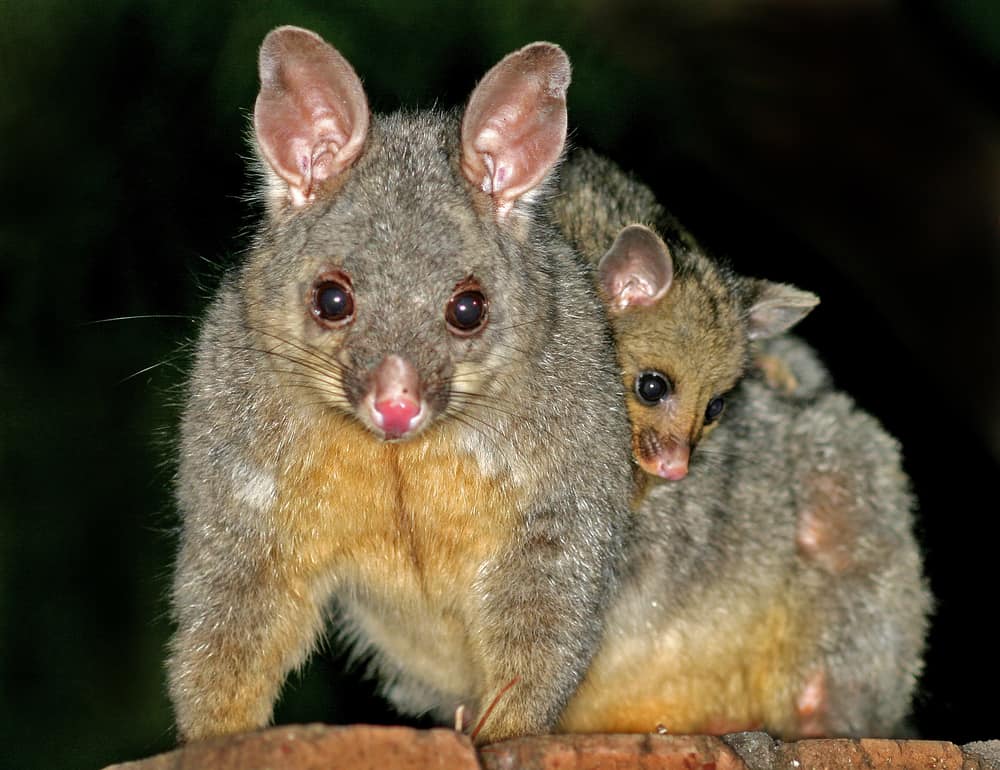
Possums are marsupials.
©Stuart Elflett/Shutterstock.com
A possum is a type of mammal called a marsupial. Marsupials have pouches for carrying their young after birth. This group includes kangaroos, wallabies, and koalas. The term “possum” may refer to either the possums of Australasia or the opossums of North, Central, and South America. While the geographical distinction between possums and opossums is important, this article will use the term “possum” to refer to both types unless otherwise specified.
The most commonly domesticated species of possums are the Virginia opossum and the short-tailed opossum. Though only the Virginia opossum naturally occurs north of Mexico, people with special permits may import other species. Sugar gliders, a species of possum from Australia, are also a favorite among possum enthusiasts.
Is It Legal to Keep Possums as Pets?
Keeping possums as pets is a controversial practice. In some areas of the world, it isn’t even legal. Most wildlife advocates and experts warn against keeping wild animals captive without extensive experience and resources to ensure their well-being. The Opossum Society of the United States recommends not keeping possums as pets at all. Below you will find a discussion of the legality of the practice in the United States and Australia, where most possums and opossums live.
The United States
Whether or not you can keep a possum as a pet in the United States depends largely on individual state laws. Governments classify possums as exotic pets and generally regulate human interactions with them. Below is a complete list of the regulations regarding pet possums in all 50 states. Because regulations are subject to change, always be sure to check the most recent laws in your state or country before attempting to purchase or capture a possum.
States That Permit Pet Possums Without a Permit
The following states permit possums as pets without a permit:
- Arkansas
- Delaware
- Florida (honey possums and sugar gliders)
- Oregon (short-tailed opossum)
- Wisconsin
- Wyoming
States That Permit Pet Possums with a Permit
The following states may permit possums as pets with a permit:
- Arizona (short-tailed opossum)
- Colorado
- Florida (all other opossum species)
- Illinois
- Indiana
- Kansas
- Kentucky
- Maine
- Maryland
- Michigan
- Minnesota
- Mississippi
- Missouri
- Montana
- Nebraska
- Nevada
- New Hampshire
- New Jersey
- New Mexico
- New York
- North Dakota
- Ohio
- Oklahoma
- Oregon (Virginia opossum)
- Rhode Island
- South Carolina
- South Dakota
- Utah
- Virginia
- West Virginia
States That Prohibit Pet Possums
The following states prohibit possums as pets:
- Alabama
- Alaska
- Arizona (Virginia opossum and all other possum species)
- California
- Connecticut
- Georgia
- Hawaii
- Idaho
- Iowa
- Louisiana
- Massachusetts (except sugar gliders)
- North Carolina
- Pennsylvania
- Tennessee
- Texas
- Vermont
- Washington
Australia
The Australian government extends protection to possums of all species. For this reason, the hunting, trapping, and relocation of possums are illegal on this continent. Homeowners can’t even move a possum off their property without a special license or the help of a licensed relocator.
Because possums are protected, it is illegal to keep them as pets. Special permits do exist for keeping captive possums, but the government mostly grants these to zoos or similar organizations. Breeding and releasing possums into the wild are especially irresponsible.
Possums as Pets
One reason so many places forbid pet possums is because of their specific needs. Possums are wild animals by nature and have different care requirements than common domesticated animals like dogs and cats. Before attempting to keep a possum in your home, do extensive research on their needs and consider carefully your ability to provide for them.
Below are several factors to keep in mind when preparing for a pet possum.
Diet

The possum is an opportunistic eater.
©Bryce McQuillan, CC BY-SA 2.0, via Wikimedia Commons – License
Possums need a diet high in protein and low in fat. Depending on the species, they will require differing amounts of plant matter, insects, or animal flesh. It can be difficult (and expensive) to strike the right balance and mimic the diversity of a possum’s natural diet. Kibble or other types of pet foods are usually insufficient for a possum’s needs. It is vital to ensure possums get enough calcium and phosphorus in their food.
Unfortunately, an improper diet can lead to all sorts of health issues including Metabolic Bone Disease (MBD), a condition that causes brittle bones and difficulty walking.
Lifespan and Health Issues
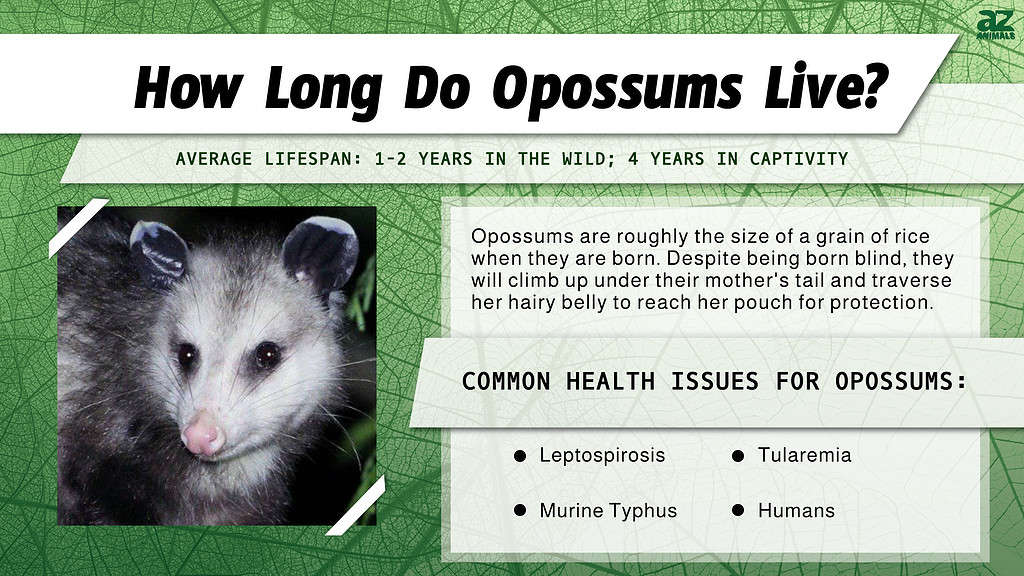
A possum’s short lifespan may be either an advantage or disadvantage depending on the owner, but for most people, saying goodbye to their beloved pet is heart-wrenching. Possums only live an average of 2-7 years and commonly suffer from a range of health conditions including parasites and urinary tract infections. Obesity and poor eyesight are also concerns for possums over one year of age.
Possums are Nocturnal
Did you know possums are nocturnal? That’s right, they sleep during the day and become active at night! This means you may have to put up with the thumps, scuffles, and scratches of your very own night owl. Your possum may even want to go outside where it can find the kind of food it’s used to.
Cost
There may be additional costs relating to owning an exotic pet including, but not limited to, permit fees. Finding a veterinarian able and willing to treat an exotic pet may also be a struggle, leading to increased costs associated with transport or specialized treatment.
Rehabilitating Possums
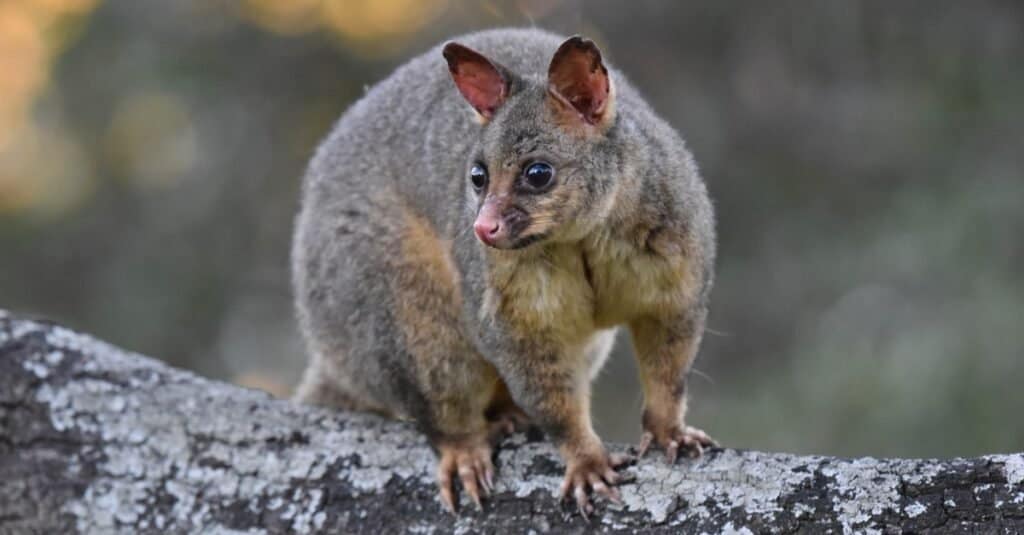
Wildlife rehabilitators take care of sick possums and release them back into the wild.
©Timothy Christianto/Shutterstock.com
One alternative to possum ownership is wildlife rehabilitation. Licensed wildlife rehabilitators take care of injured, sick, or orphaned wildlife with the intention of releasing them back into the wild. To obtain a permit to keep a pet possum, applicants in some states must demonstrate experience caring for wildlife.
However, applicants may consider becoming wildlife rehabilitators themselves or volunteering with a local organization. This is a way to care for wild animals without the associated costs and stress associated with owning an exotic pet. More importantly, it may prevent the suffering so often experienced by possums under the care of inexperienced owners.
Some people choose to keep possums as pets depending on the laws in their area. Occasionally, this arrangement works well. However, many cases end in heartbreak for the owner and unnecessary suffering for the possum. Though it is possible to keep a possum as a pet, it isn’t advisable. To find out how best to deal with wildlife in need in your area, contact local authorities or wildlife rehabilitation organizations.
Bonus: Is There a Difference Between Possum and Opossum?
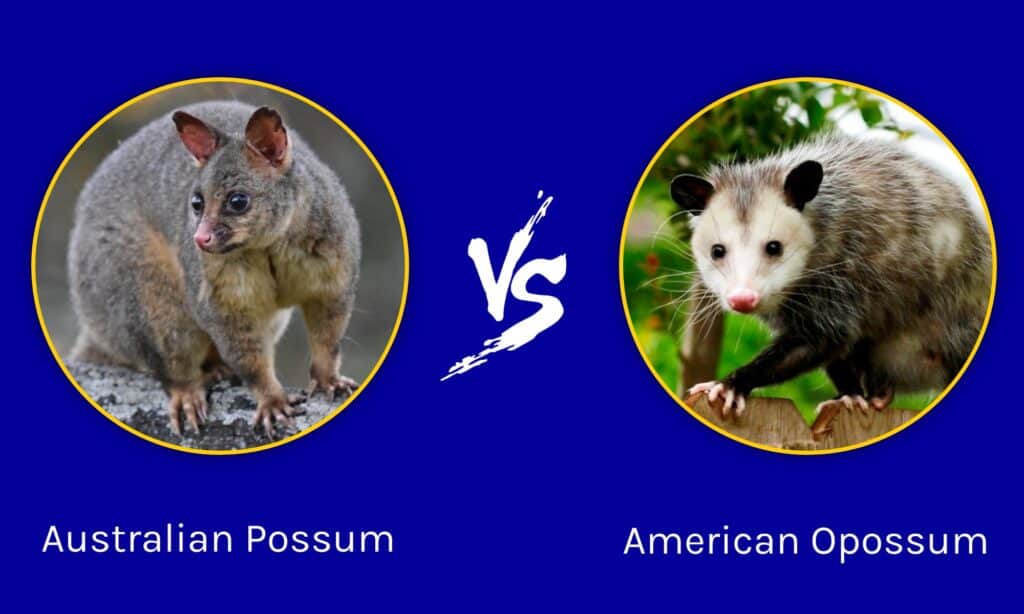
The monikers “possum” and “opossum” are often used interchangeably for the animals that originate both in Australia and North America. In general, the Australian marsupial is known as a possum, though it can also be labeled an opossum. On the flip side, the American critter is technically an opossum, but can be referred to as possum. So what’s the difference between the two?
These two creatures do resemble each other but also have differences due to their geographic separation. The North American species is a member of the order Didelphimorphia and the family Didelphidae. The most common species is the Virginia opossum. Opossums appear rat-like with long bodies, gray fur, hairless tails, opposable thumbs on their hind feet, and pointed noses. Foods they consume include insects, small animals, and fruits.
Australian possums, members of the Phalangerida infraorder within the order Diprotodonti, belong to three families: Phalangeridae, Pseudocheiridae, and Petauridae. They are native to Australia, New Guinea, and New Zealand, where they spend most of their time in trees. Their bodies are more stout and compact, their tales are bushy, and they have round faces with large eyes. Their fur colors can vary from gray to brown to black to red. While possums also eat fruits and insects, they also consume flowers, and some species are completely herbivorous.
The photo featured at the top of this post is © Bryce McQuillan, CC BY-SA 2.0, via Wikimedia Commons – License / Original
Thank you for reading! Have some feedback for us? Contact the AZ Animals editorial team.



